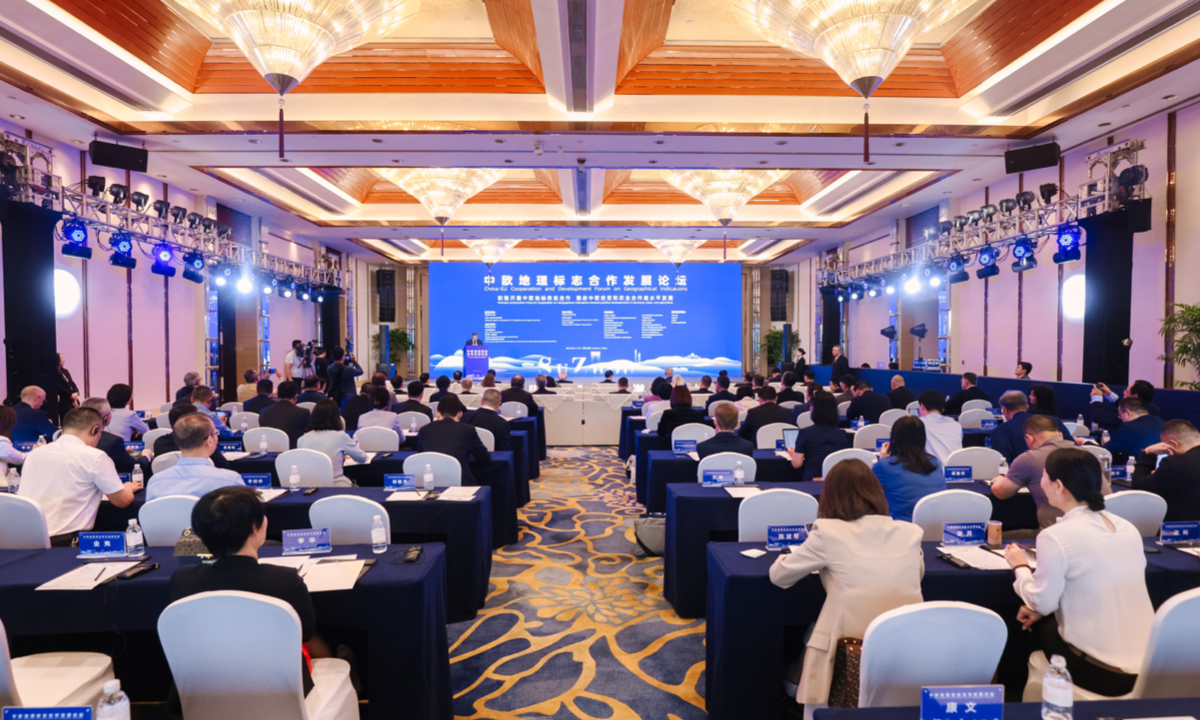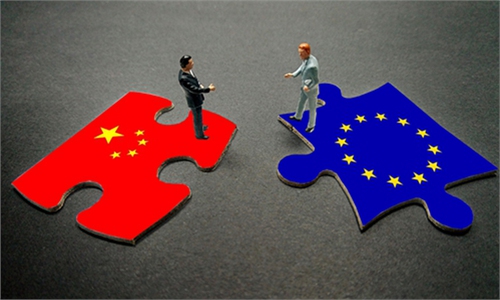China, EU to expand mutual protection of quality products, adding positivity to free trade

China-EU Cooperation and Development Forum on Geographical Indications (GI) is held in Suzhou, East China's Jiangsu Province on Friday. Photo: Courtesy of China-EU Association
China and the EU have agreed to expand the scope of protected geographical indications (GI), which is expected to open up markets and enhance mutual recognition for quality products, according to the China-EU Cooperation and Development Forum on GIs, which was held on Friday in Suzhou, East China's Jiangsu Province.
Forum attendees from both sides expressed a strong will to continue pragmatic cooperation and partnership, which has brought benefits to both sides and added positivity, at a time when globalization and free trade are facing challenges.
A GI is a label used for identifying the geographical origin of a product, which specifies not only the location, but also its processing characteristics, and is an important type of intellectual property right.
With the mutual recognition of geographical indications between China and the EU, quality European products, such as wine, cheese and ham, are being discovered and imported to China to meet Chinese people's growing interest in such products.
The China-EU agreement on geographical indications took effect on March 1, 2021. As China's first comprehensive, high-level bilateral agreement on GIs, it includes nearly 200 GIs from both sides in the first batch of protected products.
The Global Times learned from the forum that China and the EU have each listed a second batch of 175 items in the GI list for further mutual recognition.
Liu Qibao, president of China-EU Association, said in his address to the Friday forum that "GI cooperation is not only of great significance in promoting the high-quality development of China-EU economic and trade cooperation, but is also conducive to protecting traditional Chinese and European culture, and protecting the ecological environment."
Song Jingwu, vice president and secretary-general of the China-EU Association, told the Global Times that thanks to the GI agreement, GI products have seen a pickup in bilateral trade, particularly EU exports to China.
John Clarke, director of International Relations at the European Commission's Directorate-General for Agriculture and Rural Development, told the Global Times on Friday that China and Europe both face the challenge of revitalizing rural areas. Farmers have low income and young people are reluctant to stay in the sector.
The protection of GIs is one way for the two sides to cooperate on addressing the problem, Clarke said, adding that Europe can learn from China's extensive application of technology, such as agricultural drones and mobile phone monitoring.
In his addressment, Liu also stressed that both China and the EU are major political and economic powers, playing a key role in world peace and development. Deepening bilateral cooperation can contribute more to world prosperity, Liu noted.
Multiple European leaders including French President Emmanuel Macron have visited China this year and the two sides also have frequent bilateral interactions at multiple occasions, including the G20 summit.
Admittedly the two sides are facing some challenges, including the latest EU anti-subsidy probe into China's electric vehicles and continuous third-party attempts to create discord between China and the EU.
Through frequent engagement, the two sides have mastered the major direction of the bilateral relationship to continue developing within the framework of comprehensive strategic partnership, Song said.
When it comes to friction, the two sides should work out the problems through cooperation, Clarke said, underlining the importance of not letting political differences interfere with pragmatic agricultural and food cooperation.
Former Irish Prime Minister Bertie Ahern told the Global Times that Ireland, as a small country with relative economic success, has developed not through protectionism or restrictions, but by allowing free trade and protecting intellectual property.
Tariffs and sanctions harm business, Ahern said. "It was only when we did away with the tariffs and the restrictions and opened up trade, that development was realized," he noted.
"Every time we move away from restrictions, we develop more," Ahern said.
In addition to agricultural and food products, Ahern also named other areas of shared stances and further cooperation, including climate change, biodiversity and environmental protection.

